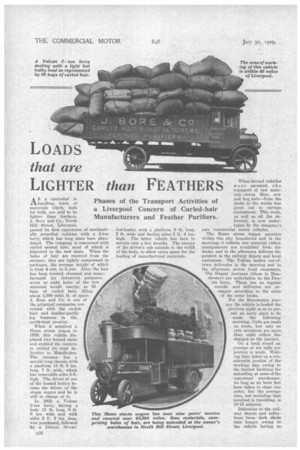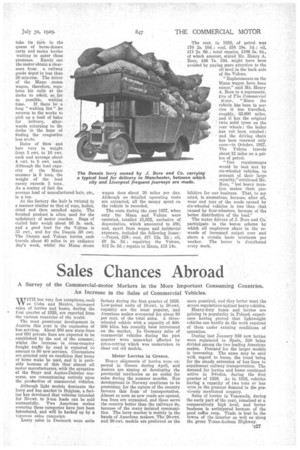LOADS that are
Page 48

Page 49

If you've noticed an error in this article please click here to report it so we can fix it.
LIGHTER than FEATHERS
Phases of the Transport Activities of a Liverpool Concern of Curled-hair Manufacturers and Feather Purifiers.
AS a specialist in handling loads of materials which, bulk for bulk, are said to be lighter than feathers, J. Bore and Co., North Hill Street, Liverpool, gained its first experience of mechanically propelled vehicles with a 2-ton lorry, which has long since been abandoned. The company is concerned with curled animal hair, most of which is imported in the raw state. When the bales of hair are received from the steamer, they are tightly compressed in packages, the average weight of which is from 4 cwt to 5 cwt. After the hair has been treated, cleansed and inanefactur6d for industrial purposes, seven or eight bales of the row material would emerge as 65 bags of curled hair, filliug about 1,000 cubic ft. of space. J. Bore and Co. is one of the principal companies concerned with the curledhair and feather-purifying business in the',
north-west country. .
When it acquired a Mann steam wagon in 1920, this vehicle displaced two horsed carts and enabled the concern to extend its road deliveries to ManChester. The steamer has a special long chassis with a platform 14 ft. 6 ins. long, 7 ft. wide, which has removable sides 3 ft. high. The driver of one of the horsed lorries became the driver of the steam wagon and he is still in charge of it.
ILL 1922 a Vulcan 2-ton lorry, having a body 15 ft. long, 6 ft. 9 ins, wide and with side-8 2 ft. 9 ins, deep, was purchased, •followed by a Dennis 30-cwt. Whenhorsed vehicles were operated, the transport of raw material—cocoa fibre, cow and hog hair—from the docks to the works was given. out to cartage contractors. This work, as well as all the deliveries, is now undertaken by the company's Own commercial motor vehicles.
The Mann steam wagon operates within Athe city boundaries and in the mornings it collects raw material (when consignments are available) from the docks, and in the afternoon delivers the -product to the railway depots and local custo(ners. The Vulcan makes out-oftown deliveries in the morning and in the afternoon serves local customers.
The longest journeys (those to Manchester) are undertaken by the Den nis lorry. There are LIO regular rounds, and deliveries are ar ranged according to the state of the order books.
For the Manchester journey the vehicle is loaded the Previous night so as to per mit an early start to be made the following morning. Calls are made en route, but only on rare occasions are more than eight orders discharged on the journey. On a local round an average of six calls per journey is made. Waiting time takes up a considerable portion of the working day, owing to the limited facilities for unloading at some of the customers' warehouses. As long as an hour has been taken to clear one order, but the average time not including that involved in travelling, is 10-15 minutes.
Deliveries to the railway depots and collections from dock sheds take longer, owing to the vehicle having to take its turn in the queue of horse-drawn carts and motor lorries waiting to enter these premises. Rarely can the motor obtain a clearance from a railway goods depot in less than 30 minutes. The driver of the Mann steam wagon, therefore, regulates his calls at the docks to aivid, so far as possible, waiting time. If there be a long "waiting list" he returns to the works to pick up a load of bales for delivery, afterwards returning to the docks in the hope of finding the congestion less acute.
Bales of fibre and hair vary in weight from 3 cwt. to 10 cwt. each and average about 4 cwt. to 5 cwt. each. Although the load capacity of the Mann steamer is 5 tons, the weight of the load rarely exceeds 3 tons. As a matter of fact the average load of manufactured hair, etc., is a ton.
At the factory the hair is twisted in a manner similar to that of rope, boiled, dried and then unrolled again. The finished product is often used for the upholstery of motor coaches. Bags of curled hair weigh about 56 lb. each, and a good load for the Vulcan is 35 cwt., and for the Dennis 30 cwt. The Dennis and Vulcan lorries each travels about 40 miles in an ordinary dais work, whilst the Mann steam wagon does about 30 miles per day. Although no detailed operating costs are extracted, all the money spent on the vehicle is recorded.
The costs during the year 1927, when only the Mann and Vulcan were operated, totalled £1,032, exclusive of depreciation, which amounted to £80, and, apart from wages and incidental expenses, included the following items : —Petrol, £58; coal, £73 12s. 2d.; oil, £9 3s. 3d.; repairing the Vulcan, Li 2 3s. 5d.; repairs to Mann, £15 14s. The cost, in 1928, of petrol was £70 2s. 10d. ; coal, £58 19s. id. ; oil, £11 2s. 6d.; total repairs, £109 5s. 8d., of which amount, stated Mr. Henry A. ' Bore, £48 7s. 10d. might have been avoided by paying more attention to the oil level in the back axle of the Vulcan.
"Replacements on the Mann wagon have been minor," said Mr. Henry A. Bore to a representative of The Commercial Motor. "Since the vehicle has been in service it has travelled, roughly, 63,000 miles, and it has the original twin solid tyres on the rear. wheels ; the boiler has not been retubed ; and the driving chain has been renewed only once—in October, 1927. The Vulcan travels about 12 miles on a gallon of petrol.
"Our requirements would be best met by six-wheeled vehicles, on account of their large capacity," continued Mr. Bore, "but heavy taxation makes them prohibitive for our business. That, to my mind, is anomalous, because, after all, wear and tear of the roads caused by six-wheeled vehicles is less than that caused by four-wheelers, because of the better distribution of the load."
The motor drivers of J. Bore and Co.' participate in the bonus scheme by which all employees share in the rewards of increased output over and above a certain basic minimum per worker. The bonus is distributed every week.












































































































